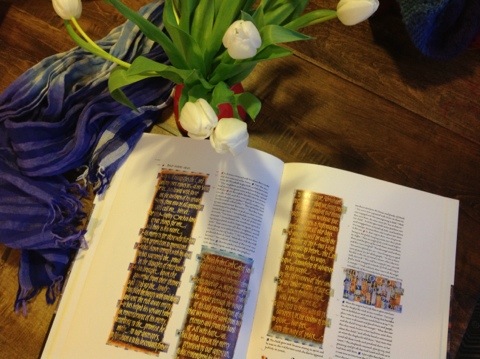“Mary Speaks”
Mary’s song, the Magnificat, from Luke 1, as portrayed in the St. John’s Bible.
Music shapes our theology. Especially, often, the words that we sing. When I was a student pastor, one of my congregants told me that he’d absconded with a church hymnal. He’d kept it for years in the back of his truck, next to his toolbox. He read it during lunch breaks. He wondered if it was bad that he didn’t read the Bible on his breaks. But he knew the songs and they resonated with him, in the literal and figurative sense of the word.
I met an old friend of a song again last night, and suddenly realized that this song has helped me write countless sermons. The text is a beautiful poem, “Mary Speaks,” by Madeleine L’Engle.
O you who bear the pain of the whole earth, I bore you.
O you whose tears gave human tears their worth, I laughed with you.
You, who when your hem is touched, give power, I nourished you.
Who turn the day to night in this dark hour, light comes from you.
O you who hold the world in your embrace, I carried you.
Whose arms encircled the world with your grace, I once held you.
O you who laughed and ate and walked the shore, I played with you.
And I, who with all others, you died for, now I hold you.
May I be faithful to this final test, in this last hour I hold my child, my son;
His body close enfolded to my breast:
The holder held, the bearer borne.
Mourning to joy, darkness to morn.
Open, my arms; your work is done.
It took the Church a couple of centuries to sort through what it meant that God became human in the person of Jesus Christ. I don’t view these centuries of debate as a shortcoming, or proof that Christians made stuff up: I think the nature of Christ is a really difficult concept, and understandably took generations of Christians thinking together to figure it out. The big fancy name theology folks use for this aspect of Christian thinking is “Christology” (the study of Christ).
During those centuries, one of the big items of debate about Jesus’s human nature was actually about Mary. If Jesus was fully human and fully divine, could one call Mary “the Mother of God”? (The Greek word they used was “theotokos” which means, “the God bearer.”) Or was that a little too far? Was she only “christokos,” “the Mother of Christ”?
In 431, the Church held a council at Ephesus, and decided that it was appropriate to call Mary “theotokos.” Because if Jesus was one person, who was both human and divine in nature, then Mary must be the mother of that one person. (Note to Protestants: the Church was still one big-C Church back in 431. So this is a decision about church doctrine that we Protestants are completely in agreement with, the same way that we buy into doctrines like the Trinity. In other words, you can call Mary “theotokos” and be completely orthodox in doing so. In fact, I’d say it’s a little heretical not to!)
I first heard “Mary Speaks” when I sang it in the first year women’s choir at my college. I knew the bare basics of Christology, but I didn’t learn the deep history until later in college, and then, even deeper, as a seminarian. I’ve even sat in the ruins of the place where this decision was made in Ephesus.
But, while I was learning the history and the ins and outs of the Greek terminology, L’Engle’s words were resonating in my head.
When I sang this piece in college, there was not a mother among those of us in the choir. Except for our choir director. She got it, the power of this connection between Mary and Jesus, the way that the relationship between a mother and child is the absolute primal relationship of the human experience. And she cried while we sang it.
We 18 years old cried, too. Partly because our director cried; partly because we understood something of the intensity of mother-child relationships; largely, I suspect, because the musical arrangement, by Daniel Gawthrop, is, as my choir directing friend last night pointed out, “raw and exposed.”
I was sucking back tears when I sang it last night, this time as a thirty-something mother, too.
These words have taught me that the doctrine of the humanity of Christ is not just some intricate Greek wording that I barely understand. It’s full of paradox: the one who holds the universe can be held; the one who bears the sins of the world can be borne by a human woman. It is sweet and comforting that God comes to us as a baby. It is messy and horrible that God comes to us in the form of one who can die.
Christ’s humanity means that the God in whom we live and move and have our being, the One who is the most primal source of all we are as humans, has entered into our lives as a human who has experienced the deepest intimacy and love of human relationship as well.
To quote another song, how can we keep from singing? There are no words that fully capture the gravity of this. We need music, and probably tears as well, to get the full sense of what it means.

Erica, in this mother’s view, this is one of the most beautiful pieces you’ve written. Thank you. Rereading now.
27 February 2013 at 6:03 pm
I hope you don’t mind that I’ve used a few of your words in the newsletter article I’m writing this month. (With attribution, of course!)
28 February 2013 at 8:51 am
Thank you, Jodi. I’m flattered!
1 March 2013 at 12:10 pm